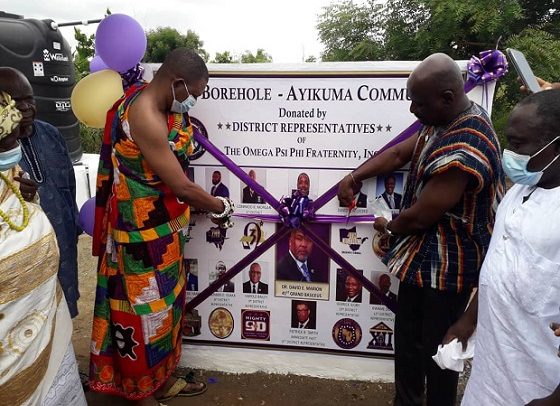The Chief of Dodowa and the Director of Diaspora Affairs at the Office of the President cutting the tape to commission
the borehole
An organisation of African-American professionals in the United States, Omega Psi Phi, has partnered with a non-governmental organisation, Team CSR Ghana, to provide 50 mechanised boreholes to some 50 Ghanaian communities.
The GH₵1 million initiative, known as the ‘Water for Life’ project, was started in 2019 with the aim of improving the living conditions of Ghanaians who do not have access to potable water.
The first borehole under the project was commissioned at the Akropong School for the Blind when the country marked the Year of Return in 2019.
The 50th borehole was commissioned for a community of about 300 people at Ayikumah within the Shai Osudoku District of the Greater Accra Region on Monday.
The Director of Diaspora Affairs at the Office of the President, Akwasi Awua Ababio, commended the initiative by the African-American professionals and Team CSR, saying that collaboration between the government and the private sector was the best way to improve the living conditions of Ghanaians.
“In this climate of everybody asking for something to be fixed, I am excited you have taken it upon yourself to fix an issue by delivering water to the people here,” he said.
The ceremony was also witnessed by the Chief of Dodowa, Nene Okukrubuor Tei Kwesi Agyemang V, who expressed gratitude to Team CSR for siting two boreholes within the Shai state.
According to him, availability of safe drinking water has been a challenge to residents, especially developers.
In an interview, the Chief Executive Officer of Team CSR Ghana, Jonathan Akuamoah, he indicated that the initial target of constructing 24 boreholes under the project was extended to 100 boreholes due to the precarious water situation in some rural communities.
Access to electricity, he said, has also been a major challenge in constructing boreholes for deprived communities as mechanised boreholes would require continuous electricity supply to function.
“Unfortunately, we have to focus on places that have electricity because the boreholes are mechanised and we decided to do mechanised ones because there is a lot of problems with the manual boreholes,” he said.
By Issah Mohammed

